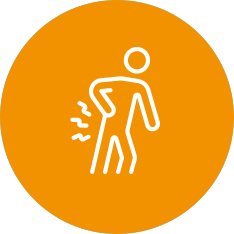New onset of Hip pain
I have new hip pain, what should I do?
Do not panic. There are many reasons as to why your hip can become painful and mostly these events are nothing to worry about. The hip is a weightbearing ball and socket joint supported by lots of soft tissues (like muscles).
Pain can often be the result of irritation around the joint or soft tissue structures (like tendons or muscles) or can sometimes be following a slip/trip/fall (trauma). Some people experiencing back problems can get pain in the hip area.
This can be easily managed by following some simple steps. Most new hip pain will resolve in 6-12 weeks.

What else can I do?
You could also try these simple exercises to help maintain good movement and support the muscles around the hip.
Exercises for New onset of Hip pain - EASY
Exercises for New onset of Hip pain - MODERATE
Exercises for New onset of Hip pain - ADVANCED
What if I have had a fall?
Please read the "symptoms to check" in the red box on the right of this screen first before using this page.
Symptoms to check
Click the plus sign to see a list of problems that could be a sign you may need to be checked urgently
Get advice now from 111 if:
- The hip pain was caused by a serious fall or accident
- Your leg is deformed, badly bruised or bleeding
- You are unable to move your hip or bear any weight on your leg
- You have numbness or tingling around your genitals or buttocks
- You have a change to your bladder and bowel control or difficulty peeing
- You have a raised temperature and you feel unwell
- You have a fever or a rash
- Your hip pain came on very suddenly and you have sickle cell anaemia
These problems could be a sign of something more serious and may need to be checked urgently
Immediate medical advice is available by contacting NHS 111


 Hip
Hip